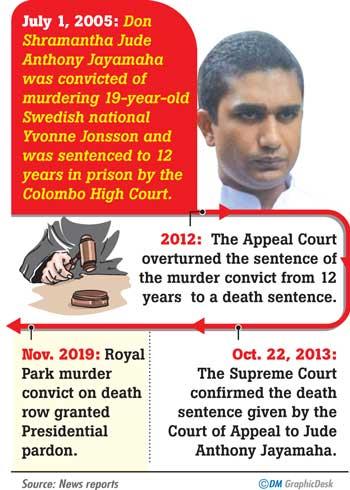19 Jul 2023 - {{hitsCtrl.values.hits}}
 By T. Farook Thajudeen
By T. Farook Thajudeen
Granting pardon to a convict by the Executive President is an absolute power conferred on the Executive President that connote be challenged under a fundamental rights petition in the Supreme Court, said Deputy Solicitor General Nerin Pulle in Supreme Court yesterday.
DSG Nerin Pulle made this assertion before the three bench judges during the inquiry into the Fundamental Rights petition filed in the Supreme Court by a women’s organization, against granting Presidential Pardon to Jude Shramantha Jayamaha, the accused in the Royal Park murder case, by former President Maithripala Sirisena.
Deputy Solicitor General Nerin Pulle assisting the Court during the inquiry, submitted that the Executive President is vested with absolute power to grant Presidential Pardon to a convict who was convicted by a court of law. He said this power is vested on the President by the Constitution of the country.
The DSG said granting Presidential Pardon to a convict is not an unnecessary intervention of the President into the Judiciary and that the president is elected by the people of this country.
The DSG said this special power vested on the President by the constitution is different from the other executive powers vested on the President.
Following the dismissal of the convict’s appeal of the Royal Park murder case by the Court of Appeal the proceedings of the Royal Park case has come to an end.
Thereafter pardoning the convict by the President is a not an unnecessary intervention of the President into the Judiciary and the process followed by the President granting Pardon to Jayamaha is a lawful and a legal process of law. The DSG further said that the petition of the petitioners was faulty.
The three judge bench on considering the submissions of Deputy Solicitor General Nerin Pulle postponed further inquiry.
25 Nov 2024 1 hours ago
25 Nov 2024 2 hours ago
25 Nov 2024 2 hours ago
25 Nov 2024 2 hours ago
25 Nov 2024 3 hours ago